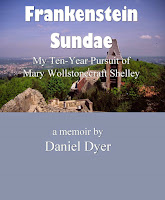Mary begins Perkin Warbeck at a high point (or low, depending on your politics)—the end of the Battle of
Bosworth Field, 22 August 1485 (immortalized by the Bard—that image of the
unhorsed Richard III offering his kingdom
for a horse).[1] Three of the losers are
galloping away. They split; others come together; they arrive in London,
believing that the King’s two nephews in the Tower are dead. But! One of the
boys has been rescued. And so the story gallops along—and Mary, remember,
declares in her Preface to the novel that
Perkin was, in reality the lost Duke of York.[2]
Through
three volumes of Perkin we travel and
encounter the internecine politics, the betrayals, the
relationships-that-shouldn’t-be—the sort of stuff that’s now so common on
popular television series.
After about
350 pages, Richard (“Perkin”) surrenders; his captors take him to the palace at
Westminster. He escapes—for a bit. Is betrayed. Re-captured. Placed in the stocks.
Right before he’s taken to his beheading, he meets with his beloved wife, Katherine: One long, affectionate kiss he pressed on
the mouth of Katherine, and as her roseate lips yet asked another, another and
another followed; their lives mingled with their breath.[3]
Years later,
Katherine (in Mary’s “Conclusion”) speaks with an acquaintance. Call it love, charity, or sympathy, she
says; it is the best, the angelic portion
of us. It teaches us to feel pain at others’ pain, join in their joy. The more
entirely we mingle our emotions with those of others, making our well or ill
being depend on theirs, the more completely do we cast away selfishness, and
approach the perfection of our nature. … I must love and be loved. … Permit
this to be, unblamed—permit a heart whose sufferings have been, and are, so
many and so bitter, to reap what joy it can from the strong necessity it feels
to be sympathized with—to love.[4]
As I read
these words again today—December 28, 2016—I am nearly overwhelmed by their
enduring relevance. Feeling the suffering and joy of others (making it your
own)—this is a human quality so absent in our polarized political world today.
We seem to be sacrificing empathy for judgment, for censure and condemnation.
Mary Shelley would be deeply disappointed in us.


No comments:
Post a Comment